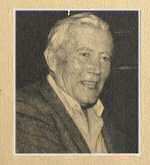Harry O. Warren

Harry O. Warren was an avid member of the UCSC Arboretum who bequested support for the Arboretum as well as the Agroecology Program.
Harry O. Warren was a native San Franciscan who loved gardens throughout his life and was especially interested in proteas. From his early childhood he loved to grow plants and had hoped to one day own a nursery. World War II erupted just as he was completing high school, and he joined the U.S. Navy and later the U.S. Marines. Upon his honorable discharge he returned to San Francisco. He lived his entire adult life in a Divisedaro apartment where he grew plants both inside and in containers on the patio. One of his friends volunteered that every square inch was covered in plants.
David Jones, a worldwide authority on orchids, and Nancy Cavenaugh, longtime member of the Arboretum Associates, remember his visits to the UC Santa Cruz Arboretum. It was his love for growing protea flowers, an exotic plant native to Australia and South Africa, that brought him to the Arboretum. They remembered him as an unassuming, unpretentious man who would ask numerous questions and listen intently to the answers. He would purchase protea plants, more often than not for a friend.
It came as a surprise to both the Arboretum and the Agroecology program when, upon his death in 1986, Harry Warren left a $600,000 bequest to establish endowments benefiting both the UC Santa Cruz Arboretum and the Agroecology Program (known today as the Center for Agroecology & Sustainable Food Systems or CASFS. Through this generous bequest the Arboretum established the Harry O. Warren Curatorship for New Zealand Plants. Thomas Sauceda was appointed the first curator and still maintains the post today.
The CASFS portion of the bequest was used to set up a fund to maintain the program's facilities. Prior to this, the center had no maintenance budget at all and had to struggle through small grants and sales of flowers and produce from the Farm and Garden to generate income for that purpose. The endowment is crucial in keeping the Farm and Garden facilities operational, safe, and in good condition, in order to support the center's extensive programs in education, training, outreach, and community service.
